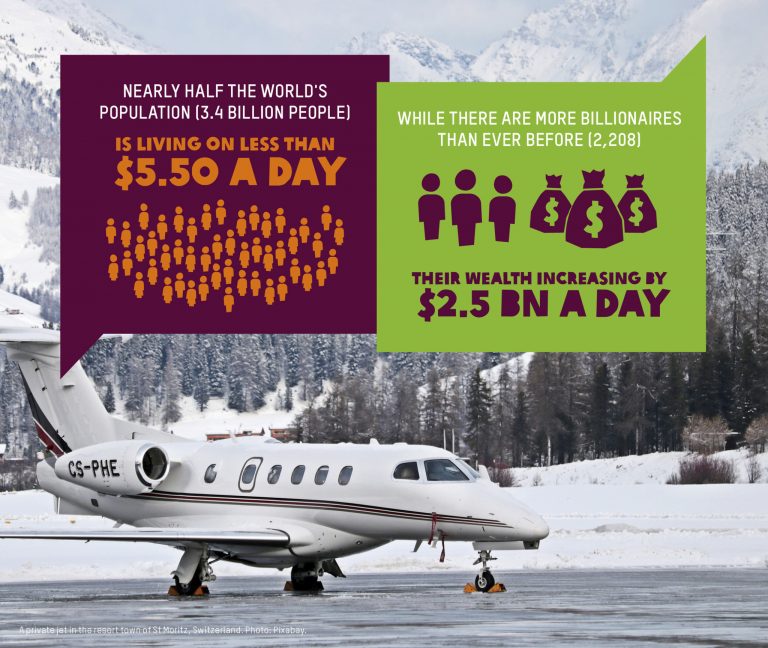First of two posts to mark the start of Davos. Tomorrow Max Lawson digs into the links between inequality and public services.

How do you follow a series of Killer Facts that have really got people’s attention? Every year the world’s political and economic leaders gather in Davos, and in recent years, Oxfam has done its best to persuade them, and their press entourage, to focus on the way that growing inequality is holding back global poverty reduction.
This kicked off in 2014 with ‘85 richest people as wealthy as poorest half of the world’. Since then, we’ve updated it every year. It’s become almost ritualized: we publish our report, get a conversation going with the media and decision makers, and then sundry critics try and scramble aboard the bandwagon by rubbishing our numbers, only to be swatted down by our in-house geeks.
Davos kicks off this week (albeit without Donald Trump). This year’s report, Public Good or Private Wealth?, has the by now familiar ‘killer facts’ – the world’s 26 richest people now own the same wealth as the poorest half of the world – down from 43 in 2017; the 3.8 billion people who make up the poorest half of the world saw their wealth decline by 11 per cent last year while billionaires’ fortunes rose 12 per cent.

But this report feels different, more ambitious in some respects: It pulls together a number of zeitgeisty influences – Piketty + #Metoo + popular exasperation with tax dodgers, all with a strong social media vibe. The Exec Sum is now an infographic (see below). It pays more attention to framing, going beyond the standard NGO report format, once memorably described to me as ‘Bad Shit; Facty, Facty’. It highlights success stories to show what is possible, and tries to develop a more joined up narrative – something like a manifesto for a feminist global welfare system to deliver the SDGs, captured in its 3 over-arching recommendations:
- ‘Deliver universal free health care, education and other public services that also work for women and girls. Stop supporting privatization of public services. Provide pensions, child benefits and other social protection for all. Design all services to ensure they also deliver for women and girls.
- Free up women’s time by easing the millions of unpaid hours they spend every day caring for their families and homes. Let those who do this essential work have a say in budget decisions and make freeing up women’s time a key objective of government spending. Invest in public services including water, electricity and childcare that reduce the time needed to do this unpaid work. Design all public services in a way that works for those with little time to spare.
- End the under-taxation of rich individuals and corporations. Tax wealth and capital at fairer levels. Stop the race to the bottom on personal income and corporate taxes. Eliminate tax avoidance and evasion by corporates and the super-rich. Agree a new set of global rules and institutions to fundamentally redesign the tax system to make it fair, with developing countries having an equal seat at the table.’
The full report is 71 pages + notes, and feels more like a compendium of background materials and research findings that other organizations and activists can mine for their own work. It is backed up by a pretty funky website.

It will be fascinating to see how it works, and whether the media is turned off by a fuller narrative, instead of an isolated killer fact. Fingers crossed, because I think the content is really good. And important. A lovely quote from Wangari Maathai captures its aspiration:
‘In the course of history, there comes a time when humanity is called to shift to a new level of consciousness… to reach a higher moral ground. A time when we have to shed our fear and give hope to each other. That time is now.’